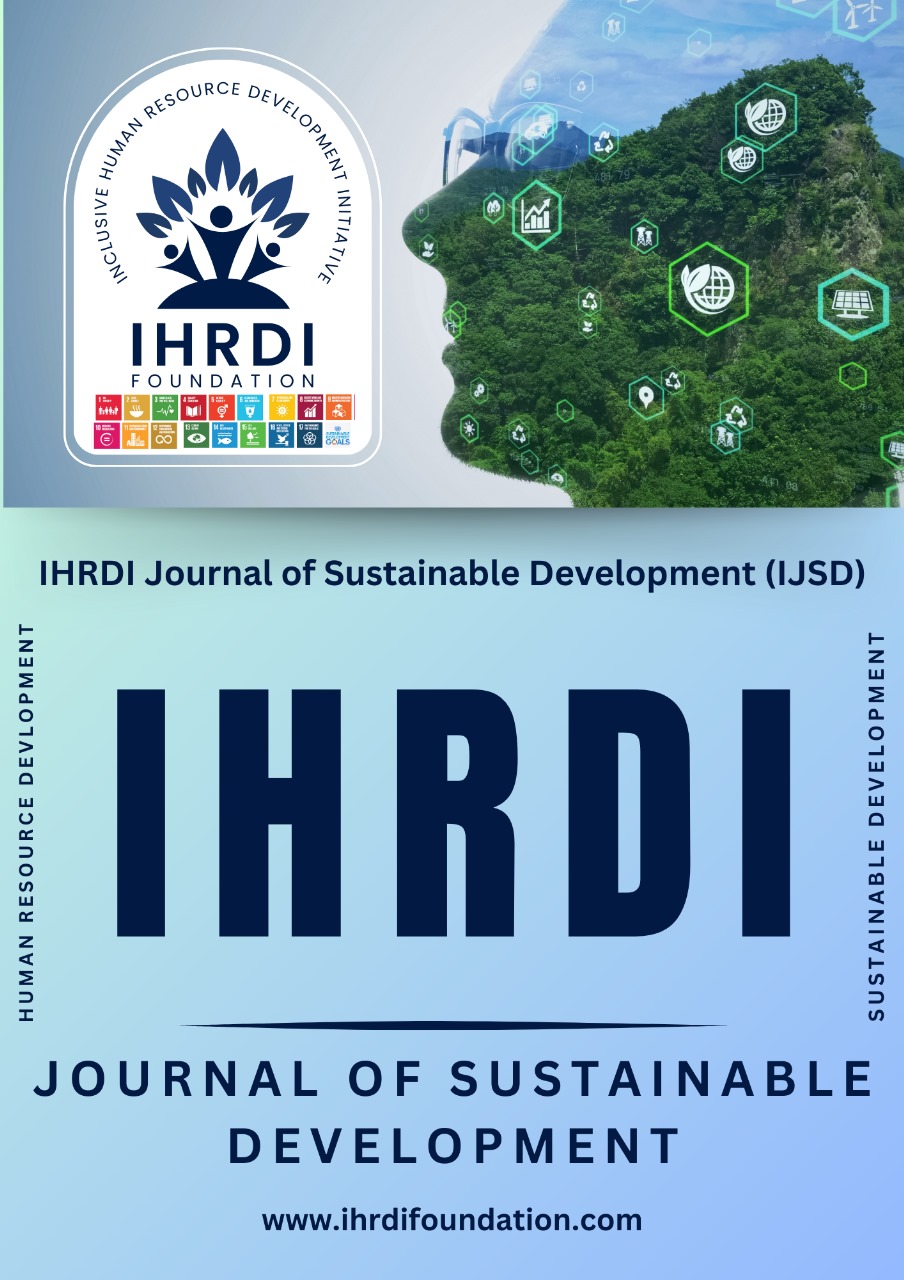Integrating Traditional and Modern Medicine for Sustainable Wellbeing
Abstract
The pursuit of sustainable wellbeing in healthcare necessitates a holistic approach that blends the wisdom of traditional healing practices with the advancements of modern medicine. This conference paper explores the integration of traditional and modern medical approaches as a strategic framework for achieving sustainable health outcomes. Traditional medicine, deeply rooted in cultural and historical contexts, offers a rich repository of knowledge and practices that have sustained communities for centuries. The paper examines the potential synergies between traditional healing methods and modern medical interventions to create a comprehensive healthcare system. By fostering a collaborative relationship between traditional healers and modern healthcare professionals, we can harness the strengths of both systems to address the complex health challenges of our time. The paper delves into case studies and examples where the integration of traditional and modern medicine has shown promising results. It discusses how combining the personalized, patient-centric focus of traditional medicine with the technological advancements and evidence-based practices of modern medicine can enhance overall patient care. Additionally, it explores the role of community engagement and empowerment in fostering acceptance and seamless integration of these diverse healthcare modalities. Furthermore, the paper addresses the challenges and ethical considerations associated with this integration, emphasizing the importance of cultural sensitivity, respect for indigenous knowledge, and the need for rigorous scientific validation. This paper advocates for a paradigm shift in healthcare that embraces the amalgamation of traditional and modern medicine to promote sustainable wellbeing. It emphasizes the potential for increased efficacy, accessibility, and cultural relevance in healthcare practices when these two approaches collaborate. Through this integration, we can pave the way for a more resilient and holistic healthcare system that prioritizes the diverse needs of individuals and communities, contributing to the long-term sustainability of global health and wellbeing.
References
World Health Organization. (2008). Traditional Medicine. Retrieved from https://www.who.int/health-topics/traditional-complementary-and-integrative-medicine#tab=tab_1
Betancourt, J. R., Green, A. R., & Carrillo, J. E. (2016). Cultural competence in healthcare: emerging frameworks and practical approaches. The Commonwealth Fund.
Barry, M. J., & Edgman-Levitan, S. (2012). Shared Decision Making—The Pinnacle of Patient-Centered Care. New England Journal of Medicine, 366(9), 780–781.
World Health Organization. (1986). Ottawa Charter for Health Promotion. Retrieved from https://www.who.int/healthpromotion/conferences/previous/ottawa/en/
World Health Organization. (2002). Traditional Medicine Strategy 2002-2005. Retrieved from https://www.who.int/medicines/publications/traditional/trm_strategy02_05_en.pdf
World Health Organization. (2005). WHO Traditional Medicine Strategy 2002-2005. Retrieved from https://www.who.int/medicines/publications/traditional/trm_strategy05_05_en.pdf World Health Organization. (2008). Traditional Medicine. Retrieved from https://www.who.int/health-topics/traditional-complementary-and-integrative-medicine#tab=tab_1 World Health Organization. (2013). Traditional Medicine. Retrieved from https://www.who.int/mediacentre/factsheets/2003/fs134/en/
National Center for Complementary and Integrative Health. (2021). Ayurvedic Medicine: In Depth. Retrieved from https://www.nccih.nih.gov/health/ayurvedic-medicine-in-depth
National Institutes of Health. (2017). Traditional Healing Practices. Retrieved from https://www.ncbi.nlm.nih.gov/books/NBK447367/
World Health Organization. (2008). Traditional Medicine. Retrieved from https://www.who.int/health-topics/traditional-complementary-and-integrative-medicine#tab=tab_1
World Health Organization. (2002). Traditional Medicine Strategy 2002-2005. Retrieved from https://www.who.int/medicines/publications/traditional/trm_strategy02_05_en.pdf
World Health Organization. (2005). WHO Traditional Medicine Strategy 2002-2005. Retrieved from https://www.who.int/medicines/publications/traditional/trm_strategy05_05_en.pdf
World Health Organization. (2008). Traditional Medicine. Retrieved from https://www.who.int/health-topics/traditional-complementary-and-integrative-medicine#tab=tab_1
World Health Organization. (2013). Traditional Medicine. Retrieved from https://www.who.int/mediacentre/factsheets/2003/fs134/en/
National Center for Complementary and Integrative Health. (2021). Integrative Health Approaches and Complementary Therapies. Retrieved from https://www.nccih.nih.gov/health/integrative-health-approaches-and-complementary-therapies
Hofmann, S. G., Sawyer, A. T., Witt, A. A., & Oh, D. (2010). The effect of mindfulness-based therapy on anxiety and depression: A meta-analytic review. Journal of Consulting and Clinical Psychology, 78(2), 169–183.
Vickers, A. J., Vertosick, E. A., Lewith, G., MacPherson, H., Foster, N. E., Sherman, K. J., ... & Linde, K. (2012). Acupuncture for chronic pain: individual patient data meta-analysis. Archives of Internal Medicine, 172(19), 1444-1453.
Shetty, P., Kapoor, N., & Bondu, J. D. (2017). Efficacy of an evidence-based multi-modality Ayurvedic intervention in diabetes mellitus—a case series. Journal of Ayurveda and Integrative Medicine, 8(4), 230-237.
National Center for Complementary and Integrative Health. (2021). Ayurvedic Medicine: In Depth. Retrieved from https://www.nccih.nih.gov/health/ayurvedic-medicine-in-depth
World Health Organization. (2003). Acupuncture: Review and Analysis of Reports on Controlled Clinical Trials. Retrieved from https://www.who.int/medicines/areas/traditional/Acupuncture_Trial_Update.pdf
Hofmann, S. G., Sawyer, A. T., Witt, A. A., & Oh, D. (2010). The effect of mindfulness-based therapy on anxiety and depression: A meta-analytic review. Journal of Consulting and Clinical Psychology, 78(2), 169–183.
World Health Organization. (2008). Traditional Medicine. Retrieved from https://www.who.int/health-topics/traditional-complementary-and-integrative-medicine#tab=tab_1
National Center for Complementary and Integrative Health. (2021). Integrative Health Approaches and Complementary Therapies. Retrieved from https://www.nccih.nih.gov/health/integrative-health-approaches-and-complementary-therapies
Betancourt, J. R., Green, A. R., & Carrillo, J. E. (2016). Cultural competence in healthcare: emerging frameworks and practical approaches. The Commonwealth Fund.
Vickers, A. J., Vertosick, E. A., Lewith, G., MacPherson, H., Foster, N. E., Sherman, K. J., ... & Linde, K. (2012). Acupuncture for chronic pain: individual patient data meta-analysis. Archives of Internal Medicine, 172(19), 1444-1453.
World Health Organization. (2002). WHO Traditional Medicine Strategy 2002-2005. Retrieved from https://www.who.int/medicines/publications/traditional/trm_strategy02_05_en.pdf
World Health Organization. (2008). Traditional Medicine. Retrieved from https://www.who.int/health-topics/traditional-complementary-and-integrative-medicine#tab=tab_1
Betancourt, J. R., Green, A. R., & Carrillo, J. E. (2016). Cultural competence in healthcare: emerging frameworks and practical approaches. The Commonwealth Fund.
World Health Organization. (2004). WHO Guidelines on Safety Monitoring of Herbal Medicines in Pharmacovigilance Systems. Retrieved from https://apps.who.int/iris/bitstream/handle/10665/43041/924159401X_eng.pdf
Barry, M. J., & Edgman-Levitan, S. (2012). Shared Decision Making—The Pinnacle of Patient-Centered Care. New England Journal of Medicine, 366(9), 780–781.
World Health Organization. (2005). WHO Traditional Medicine Strategy 2002-2005. Retrieved from https://www.who.int/medicines/publications/traditional/trm_strategy05_05_en.pdf
National Center for Complementary and Integrative Health. (2021). Ayurvedic Medicine: In Depth. Retrieved from https://www.nccih.nih.gov/health/ayurvedic-medicine-in-depth
World Health Organization. (2008). Traditional Medicine. Retrieved from https://www.who.int/health-topics/traditional-complementary-and-integrative-medicine#tab=tab_1
Institute of Medicine. (2001). Crossing the Quality Chasm: A New Health System for the 21st Century. National Academies Press.
Copyrights for articles are retained by the authors, with first publication rights granted to the journal/publisher. Authors have rights to reuse, republish, archive, and distribute their own articles after publication. The journal/publisher is not responsible for subsequent uses of the work. Authors shall permit the publisher to apply a DOI to their articles and to archive them in databases and indexes such as EBSCO, DOAJ, and ProQuest.

